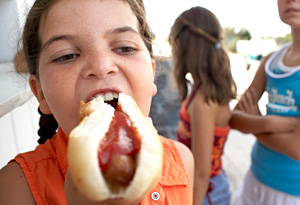Is Your Kid Obsessed with Food? How to Spot and Stop Compulsive Eating

Photo: Digital Vision/Thinkstock
Are your kids obsessed with food? Do they eat when they're not hungry or consume huge portions? Pediatrician Dr. Jennifer Trachtenberg, RealAge's children's health expert, offers 15 tips to help you close down the food addiction cycle.
I know I'm lucky. So far, my kids don't have weight problems or food struggles. But I share the pain of the children I see in my practice who are tipping the scales, spilling out of their jeans and heading down a dangerous, unhealthy path. I often see kids, especially ages 6 to 12, who have paused in growing up but are still growing out. I also see kids with serious eating disorders like bingeing and purging (anorexia nervosa and bulimia).Here's the thing: If your child eats compulsively, it may be a way to tune out (Is there trouble at home?) or escape when life gets stressful (Problems at school?). You and your family doctor need to get at those feelings and help your child develop ways to cope with them.
Most of the time, you'll find compulsive eating has nothing to do with hunger. It's a habit kids—and adults—develop to ease stress, depression, anxiety or even boredom. The other day, my daughter told me she was hungry just an hour after she had eaten. Turns out she was bored and didn't know what to do with herself. I pulled out a puzzle, and we got busy on that. So much for being hungry.
My advice? Get in prevention mode now so you don't have an unhappy, unhealthy child in a few years and a miserable young adult a few years after that. Trust me, I know what you're up against: Your kids have friends who are allowed to eat a steady diet of food from your not-a-chance list ("But mom, all my friends eat chips and onion dip after school.") and TV commercials touting the latest fat-filled lunch box junk.
Then there's the other extreme: My son Eric had a friend over and I walked into the kitchen to find him going through my cabinets. He confessed he was looking for the "candy junk closet" and was surprised when I said we didn't have one. Turns out he was so deprived of any treats in his home that he prowled friends' kitchens. You need to be careful not to be the food police to the point of deprivation.
Prevent obsessive eating with healthy habits
As a reminder, always consult your doctor for medical advice and treatment before starting any program.



